-
ORIGINAL ARTICLE07-29-2024
Evidence of validity of the Risk Self-Medication Questionnaire focused on Health Literacy
Revista Brasileira de Enfermagem. 2024;77(3):e20230386
Abstract
ORIGINAL ARTICLEEvidence of validity of the Risk Self-Medication Questionnaire focused on Health Literacy
Revista Brasileira de Enfermagem. 2024;77(3):e20230386
DOI 10.1590/0034-7167-2023-0386
Views0See moreABSTRACT
Objectives:
to analyze the validity evidence of the internal structure of the Risk Self-Medication Questionnaire Focused on Health Literacy.
Methods:
a psychometric study with 499 adults. The internal structure was assessed with exploratory and confirmatory factor analysis to prove the adjustment. Internal consistency was measured by composite reliability and McDonald’s omega coefficient (ω).
Results:
the parameters revealed a model of 35 items distributed across four factors, explaining 56% of the total variance, with factor loadings ranging from 0.31 to 0.85 and adequate communalities. Accuracy (0.79
Conclusions:
an instrument was obtained with good evidence of structural validity for measuring self-medication.
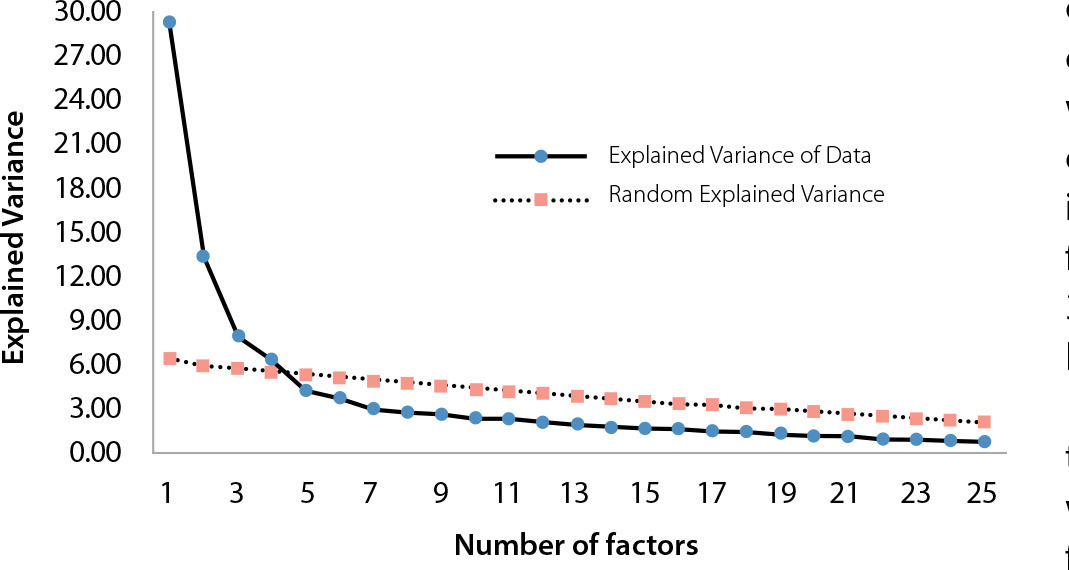
-
ORIGINAL ARTICLE07-29-2024
Nurses’ perspectives on nurses’ work methods
Revista Brasileira de Enfermagem. 2024;77(3):e20230374
Abstract
ORIGINAL ARTICLENurses’ perspectives on nurses’ work methods
Revista Brasileira de Enfermagem. 2024;77(3):e20230374
DOI 10.1590/0034-7167-2023-0374
Views0See moreABSTRACT
Objectives:
To analyze nurses’ perspectives on nurses’ work methods in the hospital context.
Methods:
A descriptive study with a qualitative approach was conducted in a hospital in northern Portugal, involving 17 nurses. Semi-structured interviews were used for data collection. Data collected between May and June 2023 underwent content analysis, supported by Atlas.ti software.
Results:
Three thematic areas emerged: “Nurses’ work methods in a hospital context,” highlighting the conception and components of work methods and the methods in use; “Implementation of nurses’ work methods,” emphasizing influencing factors and challenges to implementation; and “Impact of nurses’ work methods on patients, nurses, and institutions.”
Final Considerations:
Nurses’ work methods constitute the structure of nursing care. Some factors influence and some challenges arise in the implementation of these methods, producing impacts on patients, nurses, and institutions.

-
ORIGINAL ARTICLE07-29-2024
Nursing Process for institutionalized older adults: contributions from knowledge awareness workshop
Revista Brasileira de Enfermagem. 2024;77(3):e20230349
Abstract
ORIGINAL ARTICLENursing Process for institutionalized older adults: contributions from knowledge awareness workshop
Revista Brasileira de Enfermagem. 2024;77(3):e20230349
DOI 10.1590/0034-7167-2023-0349
Views0See moreABSTRACT
Objective:
To analyze the knowledge of professionals working in a Nursing Home about the Nursing Process before and after the awareness workshop.
Methods:
This is strategic action research, developed with nursing professionals and managers of a Nursing Home in Rio Grande do Sul, Brazil. Data were collected between January and June 2023, through semi-structured interviews before and after an awareness workshop. Discursive textual analysis of the data was carried out.
Results:
The central category “Understanding about the Nursing Process in Nursing Homes” emerged, which was unitized into two units of meaning and three categories of analysis.
Conclusion:
Data revealed non-use and lack of knowledge of the Nursing Process before awareness raising. Afterwards, a deeper understanding of the topic and its importance was identified. Awareness-raising workshops contribute to transformation of knowledge.
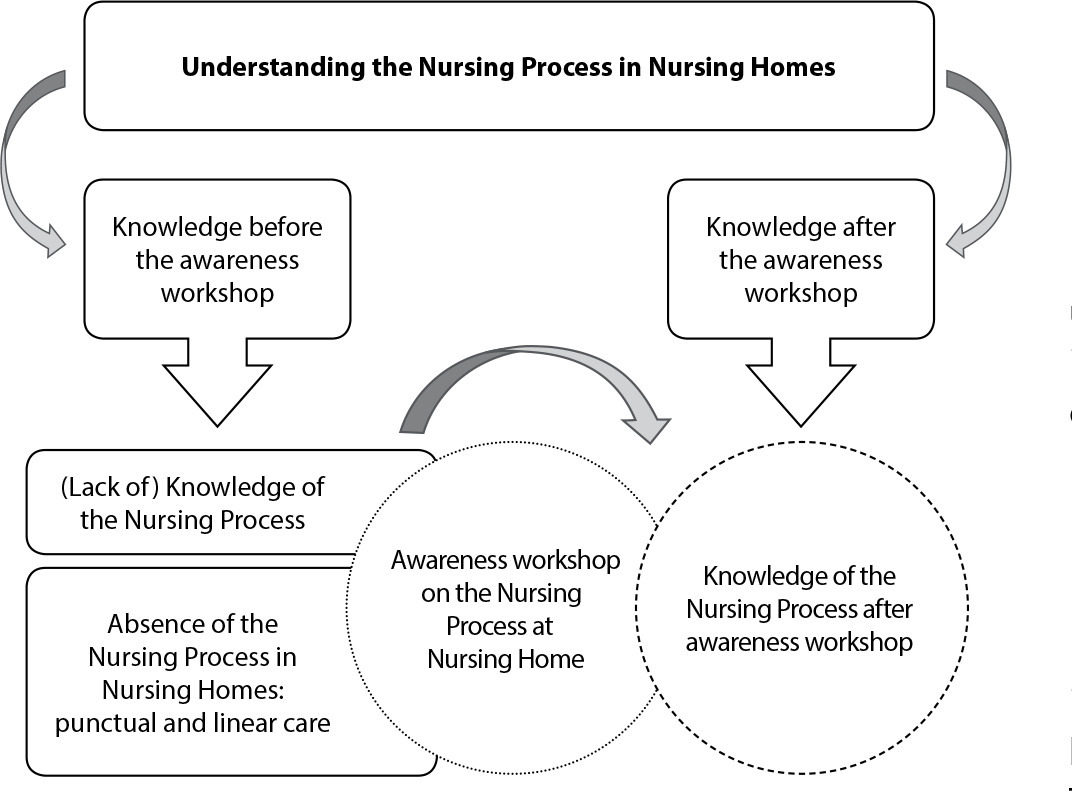
-
ORIGINAL ARTICLE07-29-2024
Excessive daytime sleepiness in nursing technicians: association with sleep quality and memory
Revista Brasileira de Enfermagem. 2024;77(3):e20230332
Abstract
ORIGINAL ARTICLEExcessive daytime sleepiness in nursing technicians: association with sleep quality and memory
Revista Brasileira de Enfermagem. 2024;77(3):e20230332
DOI 10.1590/0034-7167-2023-0332
Views0See moreABSTRACT
Objective:
to investigate excessive daytime sleepiness prevalence among nursing technicians and the association with sleep quality and memory.
Methods:
a cross-sectional, inferential study, carried out in a hospital unit in the state of Goiás between December 2020 and January 2021. Assessments were carried out using the Epworth Sleepiness Scale, the Pittsburgh Sleep Quality Index and the Prospective and Retrospective Memory Questionnaire, instruments validated for the Brazilian context. Bivariate and multivariate logistic regression analyzes were performed.
Results:
the sample consisted of 189 nursing technicians with a 40.9% excessive daytime sleepiness prevalence. In multivariate models, excessive daytime sleepiness was not associated with sleep quality, however there was a significant association with overall memory failures.
Conclusions:
study results demonstrate a high excessive daytime sleepiness occurrence, an association with overall memory failures and the need for psychosocial interventions for nursing technicians.
-
ORIGINAL ARTICLE07-29-2024
Educational technology for multidisciplinary training for managing waiting lists for elective patients
Revista Brasileira de Enfermagem. 2024;77(3):e20230299
Abstract
ORIGINAL ARTICLEEducational technology for multidisciplinary training for managing waiting lists for elective patients
Revista Brasileira de Enfermagem. 2024;77(3):e20230299
DOI 10.1590/0034-7167-2023-0299
Views1See moreABSTRACT
Objectives:
to construct and assess an educational technology for managing patient waiting lists for multidisciplinary training.
Methods:
study supported by Instructional Design – ADDIE model, whose stages of construction of educational technology were developed in the form of a multi-professional training course. Its respective content assessment was carried out by a committee of experts from 2021 to 2022. The analysis occurred based on the proportion of content adequacy with 95% Confidence Interval.
Results:
seventeen products were created as educational technology learning objects: five storyboards; four videos; three comic books; two pedagogical action plans; a mind map; and a YouTube® playlist. Nine experts assessed content adequacy, which reached 0.89.
Conclusions:
this educational technology contributes to the performance of professionals who manage waiting lists by reducing inequalities, alleviating differences, in addition to promoting equity in care and good health for patients in the Brazilian Health System.

-
ORIGINAL ARTICLE07-29-2024
Fuzzy Logic: vulnerability of women who have sex with women to sexually transmitted infections
Revista Brasileira de Enfermagem. 2024;77(3):e20230271
Abstract
ORIGINAL ARTICLEFuzzy Logic: vulnerability of women who have sex with women to sexually transmitted infections
Revista Brasileira de Enfermagem. 2024;77(3):e20230271
DOI 10.1590/0034-7167-2023-0271
Views0See moreABSTRACT
Objective:
To describe the possibility of applying Fuzzy Logic in analyzing the vulnerability of Women Who Have Sex with Women to Sexually Transmitted Infections/HIV/AIDS.
Methods:
We developed a Fuzzy Logic system with 17 input variables and one output variable, using data related to vulnerability in a municipality located in the Midwest region of the State of São Paulo, Brazil.
Results:
The factor with the greatest positive impact was the confirmation that a low understanding of Sexually Transmitted Infections/HIV/AIDS is associated with higher vulnerability. Conversely, the statement “Not disclosing sexual activity to healthcare professionals,” where individuals do not admit to having sex with women, had the least impact.
Conclusions:
Fuzzy Logic facilitates the identification of vulnerability, expressed through the analysis of interaction between variables in each dimension. This makes it a promising method to assist in analyzing the vulnerability of specific populations.
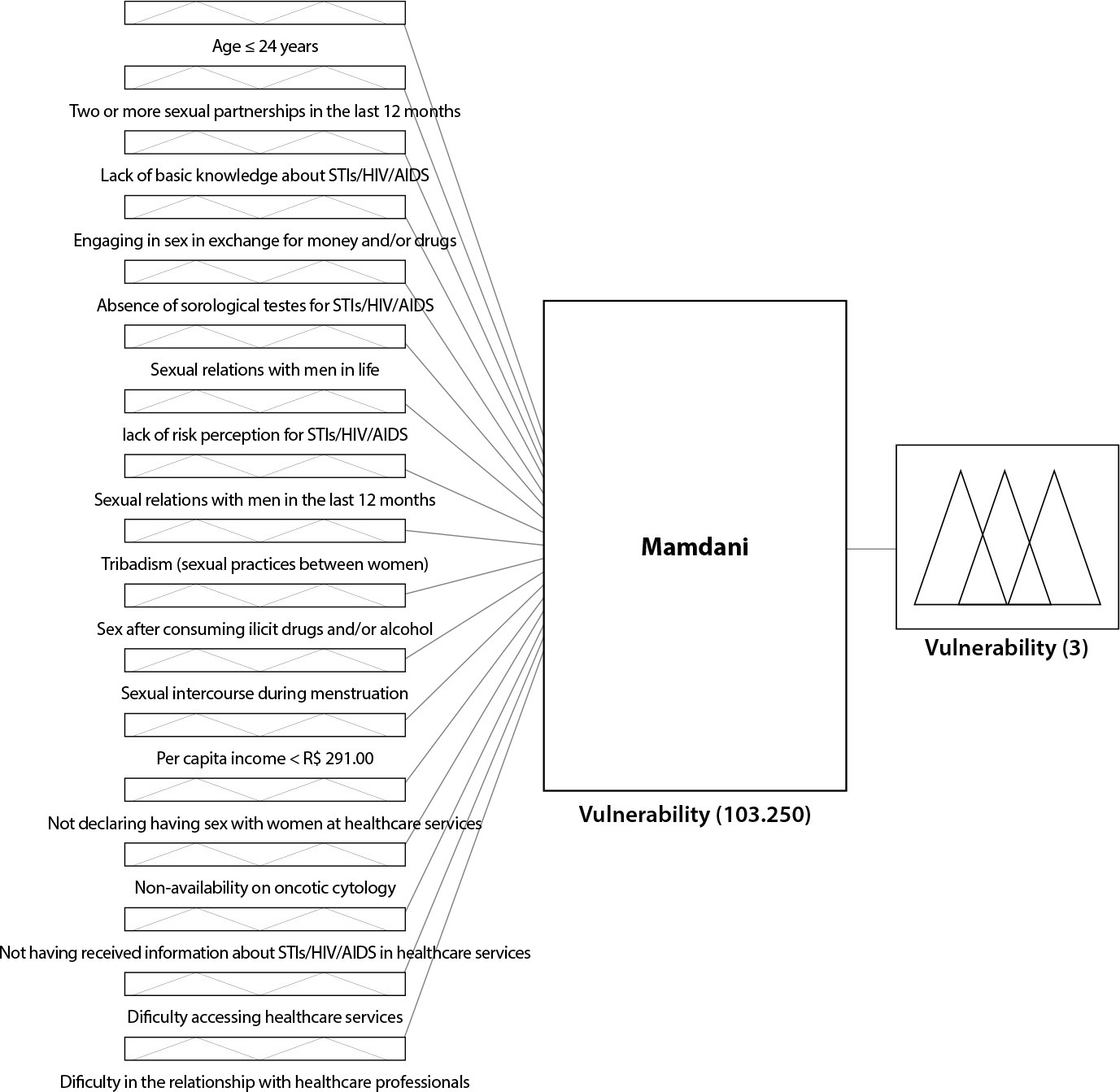
-
ORIGINAL ARTICLE07-29-2024
University Student Depression Inventory, Brazilian Version, Construct Assessment
Revista Brasileira de Enfermagem. 2024;77(3):e20230232
Abstract
ORIGINAL ARTICLEUniversity Student Depression Inventory, Brazilian Version, Construct Assessment
Revista Brasileira de Enfermagem. 2024;77(3):e20230232
DOI 10.1590/0034-7167-2023-0232
Views0See moreABSTRACT
Objectives:
to assess the University Student Depression Inventory, Brazilian version (USDI-BR), construct.
Methods:
a methodological study carried out with a snowball probabilistic sample, consisting of 334 undergraduate and graduate students. Confirmatory factor analysis, reliability using McDonald’s omega coefficient and Cronbach’s alpha were performed. Principal component analysis was performed using the varimax rotation and oblimin rotation, using the Kaiser-Meyer-Olkin criteria, Bartlett’s test of sphericity and scree plot.
Results:
the USDI-BR presented an internal consistency of items of ω = 0.95 and remained with 30 items, with the addition of 1 factor (Death wish and social withdrawal), totaling 4 factors.
Conclusions:
the USDI-BR has evidence that points to its validity and also its internal consistency, deserving that new studies be carried out to expand the evidence of its psychometric properties.
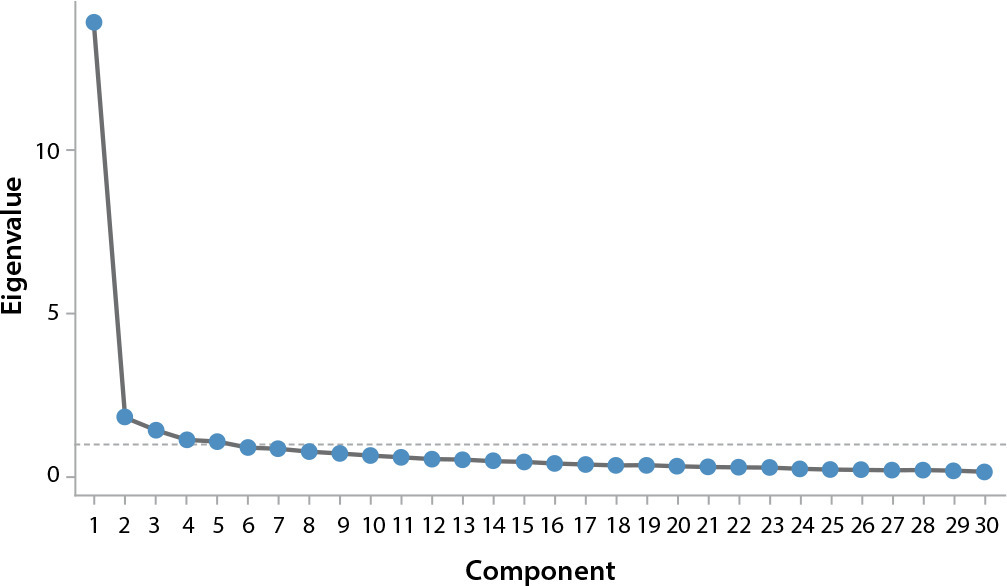
-
ORIGINAL ARTICLE07-29-2024
Family refusal of skin donation for transplantation: trends and associated factors
Revista Brasileira de Enfermagem. 2024;77(3):e20230209
Abstract
ORIGINAL ARTICLEFamily refusal of skin donation for transplantation: trends and associated factors
Revista Brasileira de Enfermagem. 2024;77(3):e20230209
DOI 10.1590/0034-7167-2023-0209
Views0See moreABSTRACT
Objectives:
to analyze the trends and factors associated with family refusal of skin donation for transplantation.
Methods:
this cross-sectional study was conducted in the State of São Paulo, with family authorization terms collected from 2001 to 2020. The variables analyzed included year, age, gender, cause of death, and type of institution. Data were analyzed using linear and multiple logistic regression, with the Odds Ratio estimated at p<0.05 for statistical significance.
Results:
1,355 individuals refused skin donation. The trend of refusals decreased between 2001 and 2009 in the age groups of 0-11 years and 12-19 years, but increased in the group aged ≥60 years. This trend continued to decrease in the 0-11 years group from 2010 to 2020, and increased in the 20-40 years group. Males and the age groups of 20-40 years, 41-59 years, and ≥60 years exhibited 27%, 34%, 47%, and 53% lower chances of refusal, respectively.
Conclusions:
there is an urgent need for measures to mitigate the high number of refusals associated with skin donation.
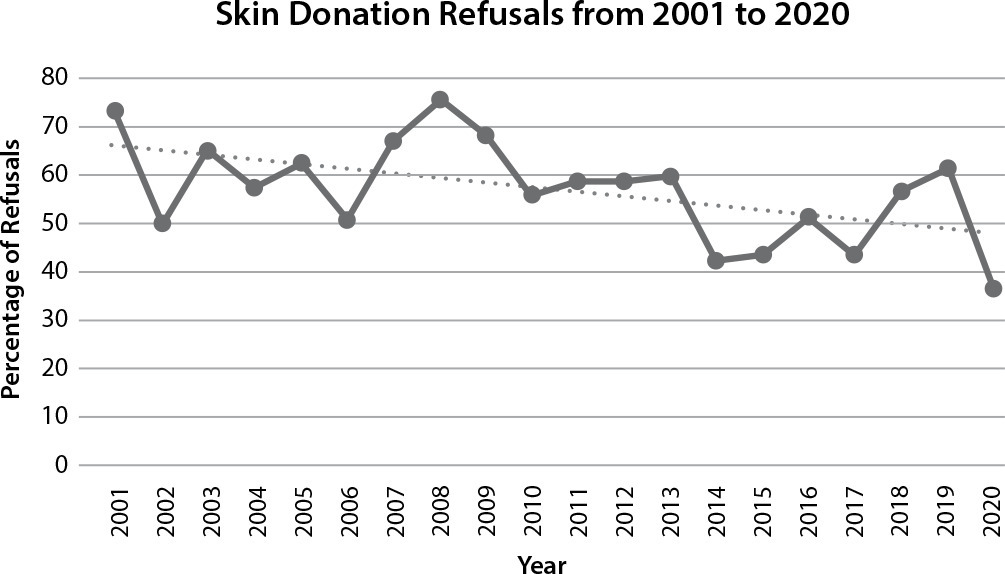
-
REVIEW03-15-2024
Nursing care for parents who have experienced fetal demise: integrative review
Revista Brasileira de Enfermagem. 2024;77(1):e20220811
Abstract
REVIEWNursing care for parents who have experienced fetal demise: integrative review
Revista Brasileira de Enfermagem. 2024;77(1):e20220811
DOI 10.1590/0034-7167-2022-0811
Views0See moreABSTRACT
Objectives:
to identify scientific evidence regarding nursing care for parents who have experienced grief following fetal demise.
Methods:
an integrative review of original studies was conducted across six databases. The studies were classified according to the level of evidence.
Results:
the qualitative analysis of the nine studies comprising the sample involved thematic categories, exploring the impact of perinatal loss on families, inadequate communication by healthcare professionals, and the importance of a holistic approach in care. The role of the nurse is highlighted in making a positive contribution to the team, emphasizing participation in training and the provision of essential information.
Final Considerations:
grieving affects not only family dynamics but also the social environment, emphasizing the urgency of a more empathetic and comprehensive approach. Care should be holistic, going beyond technical nursing assistance, and addressing the biopsychosocial context of the parents.

-
ORIGINAL ARTICLE03-15-2024
Is there scientific relevance to the plot of films and documentaries about eating disorders?
Revista Brasileira de Enfermagem. 2024;77(1):e20220547
Abstract
ORIGINAL ARTICLEIs there scientific relevance to the plot of films and documentaries about eating disorders?
Revista Brasileira de Enfermagem. 2024;77(1):e20220547
DOI 10.1590/0034-7167-2022-0547
Views1See moreABSTRACT
Objectives:
to analyze films and documentaries about eating disorders from the last twenty years, identifying the way they approach the topic as well as their relevance for didactic use in teaching the health field.
Methods:
a descriptive study, whose data collection was carried out on the main streaming and video platforms, resulting in the survey of 60 media. Of these, only 25 had audio/subtitles in Portuguese (inclusion criteria). scientific relevance was analyzed considering psychopathological and epidemiological aspects of these disorders. A questionnaire about the plot, characters and descriptive data analysis were used.
Results:
most media were dramas about female teenagers who tried to conform to beauty stereotypes, whose symptoms portrayed converged with current medical diagnostic manuals.
Conclusions:
in practical terms, a classificatory list of 11 media was prepared that could be used as a teaching resource for teaching this topic in the health field.

-
ORIGINAL ARTICLE03-11-2024
Ethnically distinct populations and coping with violence against children in the COVID-19 pandemic
Revista Brasileira de Enfermagem. 2024;77:e20230350
Abstract
ORIGINAL ARTICLEEthnically distinct populations and coping with violence against children in the COVID-19 pandemic
Revista Brasileira de Enfermagem. 2024;77:e20230350
DOI 10.1590/0034-7167-2023-0350
Views0See moreABSTRACT
Objective:
To identify policies and programs adopted by a Brazilian municipality to address violence against children during the COVID-19 pandemic.
Method:
A qualitative documentary study. The study setting was the municipality of Ananindeua, Pará, Brazil. Data was collected from official websites between November 2021 and February 2022. Thematic content analysis was used with the support of webQDA software.
Results:
Three empirical categories emerged: a) Impacts of the COVID-19 pandemic on violence against children; b) Action strategies for tackling violence against children in the COVID-19 pandemic; c) Evaluation indicators and targets for action strategies for tackling violence against children.
Final considerations:
The documents revealed few direct mentions of children, especially traditional populations; they presented superficial and ineffective evaluations of the policies and programs adopted, using exclusively quantitative indicators.
-
ORIGINAL ARTICLE03-11-2024
Experiences of women with physical disabilities in labor and delivery assistance
Revista Brasileira de Enfermagem. 2024;77:e20230290
Abstract
ORIGINAL ARTICLEExperiences of women with physical disabilities in labor and delivery assistance
Revista Brasileira de Enfermagem. 2024;77:e20230290
DOI 10.1590/0034-7167-2023-0290
Views0See moreABSTRACT
Objective:
To understand the meaning attributed by women with physical disabilities to the health care received and expected during labor and delivery.
Methods:
Qualitative study, based on Social Network Theory, conducted through an online workshop in April 2022, with the participation of six women with physical disabilities. Data, collected through the focus group technique, underwent thematic content analysis with the assistance of the IRaMuTeQ tool.
Results:
Three thematic categories emerged: Challenges experienced during pregnancy; The experience within the maternity ward; and, The importance of social networks. The assistance provided by healthcare professionals sometimes differed between what was expected and what was received by women with physical disabilities during labor and delivery.
Final Considerations:
Experiences were predominantly negative, resulting from inappropriate professional conduct due to ableist attitudes. Support from members of social networks is crucial for preventing stressors.

-
ORIGINAL ARTICLE03-11-2024
Use of an application on the measles vaccine for Warao indigenous refugees in Brazil
Revista Brasileira de Enfermagem. 2024;77:e20230253
Abstract
ORIGINAL ARTICLEUse of an application on the measles vaccine for Warao indigenous refugees in Brazil
Revista Brasileira de Enfermagem. 2024;77:e20230253
DOI 10.1590/0034-7167-2023-0253
Views1See moreABSTRACT
Objective:
To evaluate the need to develop an application with information about the measles vaccine for Warao indigenous people.
Methods:
This was a quantitative study conducted at the Espaço de Acolhimento Tapanã refugee shelter in the city of Belém, Pará, Brazil. The study sample was selected for convenience. Data were analyzed descriptively using Bioestat 5.0 software.
Results:
Twenty-one Warao indigenous individuals were interviewed. It was identified that 91% (n=20) had lost their vaccination card; 91% (n=20) stated they had lost their vaccination card more than three times, and 91% expressed interest in an application to store their vaccination information.
Conclusions:
The research provided important information for the development of a health application named WaraoMedI (Warao Measles Diversity Indigenous), as well as offered nursing professionals evidence about the challenges Warao indigenous refugees face in self-managing their vaccination information.

-
REVIEW03-11-2024
Continuing nursing education actions in the face of homophobia: an integrative review
Revista Brasileira de Enfermagem. 2024;77:e20230094
Abstract
REVIEWContinuing nursing education actions in the face of homophobia: an integrative review
Revista Brasileira de Enfermagem. 2024;77:e20230094
DOI 10.1590/0034-7167-2023-0094
Views0See moreABSTRACT
Objectives:
to analyze continuing nursing education actions in the scientific literature in the face of homophobia.
Methods:
an integrative literature review with structured search in June 2022 in eight databases, using the descriptors Nursing Education, Homophobia, Sexual and Gender Minorities. Final sample consisted of six primary studies.
Results:
continuing nursing education actions are supported by strategies such as use of teaching materials, lectures, case studies and focus groups, addressing content such as gender identity issues and affective-sexual orientation, health disparities and their relationship with homophobia in healthcare settings.
Final considerations:
carried out in various healthcare settings, continuing education actions proved to be successful in raising nurses’ awareness in facing homophobia in health services, however, their expansion is necessary to create health spaces that meet the specific needs of these people.

-
03-11-2024
O uso da ultrassonografia point-of-care na prática clínica do enfermeiro como alicerce para a segurança do paciente
Revista Brasileira de Enfermagem. 2024;77:e77suppl0201
Abstract
O uso da ultrassonografia point-of-care na prática clínica do enfermeiro como alicerce para a segurança do paciente
Revista Brasileira de Enfermagem. 2024;77:e77suppl0201
DOI 10.1590/0034-7167.202477suppl0201pt
Views0Recentemente, mais um caso de dano grave associado ao cuidado em saúde foi reportado pela mídia. Uma jovem grávida teve a mão e o punho amputados depois de dar à luz ao terceiro filho em um hospital do Rio de Janeiro(). Após o incidente ocasionado pelo acesso vascular, a mulher apresentou hemorragia e foi reinternada.Os […]See more -
03-11-2024
The use of point-of-care ultrasound in nurses’ clinical practice as a foundation for patient safety
Revista Brasileira de Enfermagem. 2024;77:e77suppl0201
Abstract
The use of point-of-care ultrasound in nurses’ clinical practice as a foundation for patient safety
Revista Brasileira de Enfermagem. 2024;77:e77suppl0201
DOI 10.1590/0034-7167.202477suppl0201
Views0Recently, another case of serious harm associated with healthcare was reported by the media. A young pregnant woman had her hand and wrist amputated after giving birth to her third child in a hospital in Rio de Janeiro(). After the incident caused by vascular access, the woman suffered hemorrhage and was readmitted.The harm caused to […]See more
-
03-06-2023
Palliative care strategies in the management of people with serious cases of COVID-19
Revista Brasileira de Enfermagem. 2023;76:e20220308
Abstract
Palliative care strategies in the management of people with serious cases of COVID-19
Revista Brasileira de Enfermagem. 2023;76:e20220308
DOI 10.1590/0034-7167-2022-0308
Views0See moreABSTRACT
Objectives:
to analyze the assistance strategies in palliative care developed in the COVID-19 pandemic for critically ill patients and their families.
Methods:
an integrative review carried out in August 2021 and updated in April 2022 in the Base de Dados de Enfermagem (BDENF), Cumulative Index to Nursing and Allied Health Literature (CINAHL), Medical Literature Analysis and Retrieval System Online (MEDLINE), US National Library of Medicine (PubMed), Web of Science databases, and presented in the PRISMA flowchart.
Results:
thirteen works were selected for reading and content analysis, from which emerged the two main themes that reflect the reality evidenced in this context: The sudden advent of COVID-19 with impacts on palliative care; and The strategies used in palliative care to mitigate these impacts.
Final Considerations:
palliative care is the best strategy for providing health care, used as a comfort to bring relief and comfort to patients and families.

-
ORIGINAL ARTICLE03-06-2023
The pandemic changes daily life and ways of living: technosociality and user/families experiences
Revista Brasileira de Enfermagem. 2023;76:e20220177
Abstract
ORIGINAL ARTICLEThe pandemic changes daily life and ways of living: technosociality and user/families experiences
Revista Brasileira de Enfermagem. 2023;76:e20220177
DOI 10.1590/0034-7167-2022-0177
Views0See moreABSTRACT
Objectives:
understand the changes imposed by the COVID-19 pandemic in the daily lives of users of Primary Health Care and their families and its impact on self-care and health promotion.
Methods:
this is a holistic-qualitative multiple case study, based on the Comprehensive Sociology of Everyday Life, in which 61 users participated.
Results:
experiencing a new daily life in COVID-19 pandemic times, users express their feelings, adaptation to new habits and ways of living. Health technologies and virtual social networks stand out in helping with everyday tasks, in communicating with loved ones and health professionals, and in validating dubious information. Faith and spirituality arise in the face of uncertainty and suffering.
Final Considerations:
it is imperative to pay close attention to the changes in daily life caused by the COVID-19 pandemic, in order to offer care directed to the singular and collective needs.

-
ORIGINAL ARTICLE03-06-2023
Construct elaboration and validity of the Pregnancy Depression Risk Scale
Revista Brasileira de Enfermagem. 2023;76(2):e20220306
Abstract
ORIGINAL ARTICLEConstruct elaboration and validity of the Pregnancy Depression Risk Scale
Revista Brasileira de Enfermagem. 2023;76(2):e20220306
DOI 10.1590/0034-7167-2022-0306
Views0See moreABSTRACT
Objectives:
to elaborate and analyze the Pregnancy Depression Risk Scale psychometric properties.
Methods:
methodological research, in six steps: theoretical model empirical definition; elaboration of scale items with literature review; consultation with five professional health experts and 15 pregnant women; content validity with six experts; pre-test-semantic validity with 24 pregnant women; scale factor structure definition with 350 pregnant women; pilot study with 100 pregnant women, totaling 489 pregnant women and 11 experts. Data were analyzed by content analysis, exploratory factor analysis, multitrait-multimethod analysis and internal consistency.
Results:
sixty-eight risk factors were identified for item formulation. The final version of the scale consisted of 24 items in five domains. The scale demonstrated satisfactory construct content, semantic, validity and reliability.
Conclusions:
the scale proved to be valid in terms of content and semantics, with a factor structure defined according to the adopted theoretical model and satisfactory psychometric properties.
-
REVIEW03-06-2023
Nursing protocols to reduce urinary tract infection caused by indwelling catheters: an integrative review
Revista Brasileira de Enfermagem. 2023;76(2):e20220067
Abstract
REVIEWNursing protocols to reduce urinary tract infection caused by indwelling catheters: an integrative review
Revista Brasileira de Enfermagem. 2023;76(2):e20220067
DOI 10.1590/0034-7167-2022-0067
Views0See moreABSTRACT
Objectives:
to analyze the production of knowledge in research articles about the effectiveness of nursing protocols for reducing indwelling urinary catheter dwell time and catheter-associated urinary tract infection rate in hospitalized adult and older patients.
Methods:
an integrative review of three full articles, available in the MEDLINE Complete – EBSCO, Scopus and Web of Science databases, from 01/01/2015 to 04/26/2021.
Results:
the three protocols reduced infection rates, and from the review/synthesis of their knowledge, a level IV body of evidence emerged to compose the nursing care process aimed at reducing indwelling urinary catheter dwell time and catheter-associated urinary tract infection.
Final Considerations:
this process gathers scientific evidence to support the elaboration of nursing protocols and, consequently, the conduction of clinical trials on its effectiveness in reducing urinary tract infection by indwelling urinary catheter.

-
ORIGINAL ARTICLE03-06-2023
Medication reconciliation in pediatrics: a validation of instruments to prevent medication errors
Revista Brasileira de Enfermagem. 2023;76(2):e20210755
Abstract
ORIGINAL ARTICLEMedication reconciliation in pediatrics: a validation of instruments to prevent medication errors
Revista Brasileira de Enfermagem. 2023;76(2):e20210755
DOI 10.1590/0034-7167-2021-0755
Views0See moreABSTRACT
Objectives:
to develop and validate the content of two instruments for promoting medication reconciliation for the transition of care of hospitalized children.
Methods:
methodological study, conducted in five stages: scope review for conceptual structure; elaboration of the initial version; content validation with five specialists using the Delphi technique; reassessment; and construction of the final version of the instruments. A content validity index of at least 0.80 was adopted.
Results:
three rounds of evaluation were carried out to reach the validity index of the proposed contents, whereas a new analysis of 50% of the 20 items of the instrument aimed at families, and 28.5% of the 21 items aimed at professionals was necessary. The instrument aimed at families reached an index of 0.93, and the instrument for professionals, 0.90.
Conclusions:
the proposed instruments were validated. It is now possible to proceed with practical implementation studies to identify their influence on safety during medication reconciliation at transition of care.

-
ORIGINAL ARTICLE03-06-2023
Organizational politics and professional struggles in nursing
Revista Brasileira de Enfermagem. 2023;76(1):e20220180
Abstract
ORIGINAL ARTICLEOrganizational politics and professional struggles in nursing
Revista Brasileira de Enfermagem. 2023;76(1):e20220180
DOI 10.1590/0034-7167-2022-0180
Views0See moreABSTRACT
Objective:
to analyze the professional struggles between nursing organizational entities, in Rio de Janeiro, during the Regional Nursing Council’s electoral process (1990-1993 administration).
Method:
historical study. We used journalistic articles, normative documents, legislation and semi-structured interviews with five nursing professionals who participated in this process. Interpretation of findings was supported by Bourdieu’s concepts of habitus, field, capital, and symbolic power.
Results:
Electoral Code changes of the aforementioned council, under the influence of administration (1987-1990), candidate for re-election, influenced the disclosure and eligibility criteria, making it difficult for broad participation, especially of Associação Brasileira de Enfermagem Rio de Janeiro Section.
Final considerations:
nursing, in this period, generated a field of disputes related to positions of power and gender, which was evidenced in the electoral process studied, which highlighted using limiting strategies by a group, making it difficult for the entire category to participate.
-
02-06-2023
Proyecto Termómetro Social COVID-19: articulaciones transnacionales para abordar poblaciones en situación de vulnerabilidad social
Revista Brasileira de Enfermagem. 2023;76:e76suppl201
Abstract
Proyecto Termómetro Social COVID-19: articulaciones transnacionales para abordar poblaciones en situación de vulnerabilidad social
Revista Brasileira de Enfermagem. 2023;76:e76suppl201
DOI 10.1590/0034-7167.202376suppl201es
Views0El COVID-19 es una enfermedad infecciosa que ha impactado significativamente diferentes contextos alrededor del mundo, directa y/o indirectamente, y en mayor escala en países pobres y/o en vías de desarrollo(). No sabemos con certeza los efectos acumulativos del COVID-19 en las poblaciones (trastornos mentales, insomnio, ansiedad, trombosis, déficit cognitivo, problemas de memoria, etc.) tras la […]See more -
02-06-2023
COVID-19 Social Thermometer Project: transnational articulations to approach populations in situations of social vulnerability
Revista Brasileira de Enfermagem. 2023;76:e76suppl201
Abstract
COVID-19 Social Thermometer Project: transnational articulations to approach populations in situations of social vulnerability
Revista Brasileira de Enfermagem. 2023;76:e76suppl201
DOI 10.1590/0034-7167.202376suppl201
Views0COVID-19 is an infectious disease that has significantly impacted different contexts around the world, directly and/or indirectly, and on a larger scale in poor and/or developing countries(). We do not know for sure the cumulative effects of COVID-19 on populations (mental disorders, insomnia, anxiety, thrombosis, cognition deficit, memory problems, etc.) after exposure to infection by […]See more
Search
Search in:
Nuvem de Tags
Adolescente (85) Atenção Primária à Saúde (239) COVID-19 (91) Criança (91) Cuidados de Enfermagem (269) Educação em Enfermagem (151) Educação em Saúde (139) Enfermagem (930) Enfermagem Pediátrica (86) Estudantes de Enfermagem (77) Estudos de Validação (131) Família (87) Idoso (208) Promoção da Saúde (99) Qualidade de Vida (104) Saúde do Trabalhador (86) Saúde Mental (145) Saúde Pública (82) Segurança do Paciente (150) Tecnologia Educacional (100)



